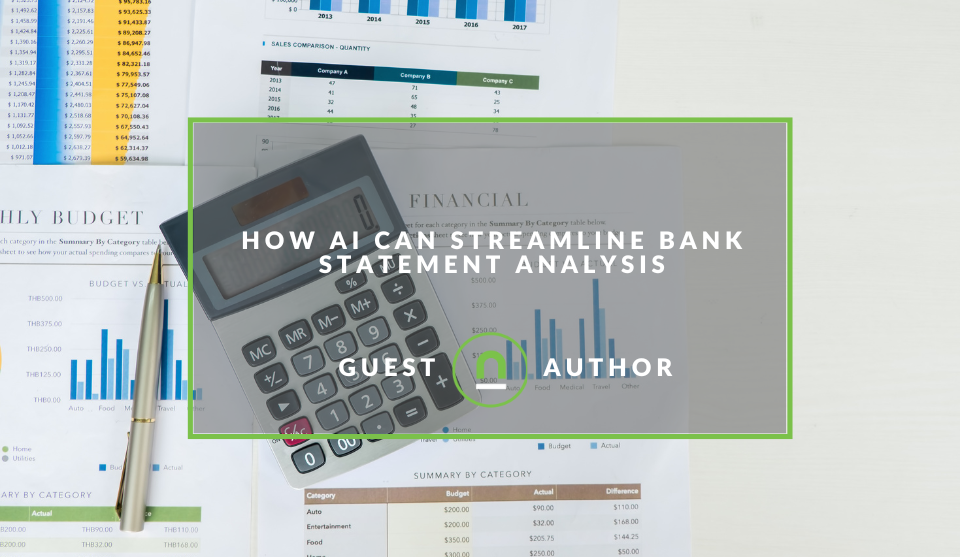Recent posts

Mind, Body & Soul
Do Not Whistle at Night: South Africas Strangest Superstitions
26 April 2025

Geek Chic
How to Replace A Broken Lenovo Laptop Screen
24 April 2025

Money Talks
Everything You Need to Know About SASSA Status Check
13 April 2025

Mind, Body & Soul
The Genetic Diversity of Cannabis Seeds
12 April 2025
Popular posts
Extravaganza
Trending Music Hashtags To Get Your Posts Noticed
24 August 2018
Geek Chic
How To Fix iPhone/iPad Only Charging In Certain Positions
05 July 2020
Extravaganza
Trending Wedding Hashtags To Get Your Posts Noticed
18 September 2018
Money Talks
How To Find Coupons & Vouchers Online In South Africa
28 March 2019
How AI Can Streamline Bank Statement Analysis
25 June 2024 | 0 comments | Posted by Rahul Bohra in Money Talks
With the evolving economy, businesses need more financial support from financial institutions to operate effectively. This demand for financial support also raises the need for critical risk assessment of borrowers/insurees to ensure that BFSI does not suffer economic loss or that fraudulent activities are not conducted against them.
Lenders collect and evaluate vast volumes of data, including bank statements, personal details, business details, credit scores, market value, etc. for risk and credit assessment processes to ensure the authenticity of borrowers/customers.
Analyzing volumes of data and extracting crucial information from it manually or with traditional methods is difficult and time-consuming, which may be porn to human error and slow down the lending process.
The VP of Advanced Analytics & AI at CIBC, Ozge Yeloglu, once rightly said,
“Big data may be cheap to collect, but it's expensive if you don’t know what you want to get out of it.”
It is essential to have the correct data and gain valuable insights from it. A bank statement is one of the crucial documents any BFSI (banking, financial service, insurance) can use when lending money or providing the right policy to the business organization.
However, extracting and evaluating bank statements is challenging with traditional methods; this is where automation and AI are leveraged to make human tasks faster and easier.
So, let's look at how AI helps in bank statement analysis.
What is bank statement analysis?
A Bank statement analysis is a prescribed process of extracting the bank statement information and analyzing the opening-closing balance monthly and yearly.
Income and expenses credited or debited, investments made, undue tax payments, unexplained money receipts or transfers, recurring transactions, etc., give insights into a person's/business's financial transactions and authenticity.
Why is bank statement analysis crucial?
As a standard practice worldwide, most banks or financial institutions require their borrowers to submit the past three months' bank statements as essential documents to evaluate risk and credibility.
Risk and credit assessment are crucial when dealing with financial transactions.
They provide insights into the borrower’s creditworthiness, such as income stability, investment plans, other debts, expenses, red-flag transactions, unexplained payments, and cash flow patterns, to ensure the borrower can repay the borrowed money and interest.
These assessments help make informed decisions regarding the borrower’s ability to pay, loan eligibility, the amount of money that can be landed, the rate of interest, and loan repayment duration.
Leveraging AI-driven bank Statement Analysis
The role of AI in bank statement analysis is vital. AI has changed the way many processes are carried out. To analyze bank statements, AI can be leveraged as follows:
Information extraction
Technology like OCR/IDP (Intelligent Document Processing) can extract relevant information from statements in any format, such as XML, JSON, PDF, Word, etc.
This makes human tasks easy by eliminating the need to manually extract information regarding income, expenses, investments, debts, recurring and nonrecurring, etc., and facilitates underwriters' evaluation of these data to ensure borrowers' ability to repay loans.
Categorization of transactions
Bank statements contain multiple transactions, including income, expenses, various investments (FDs, mutual funds, equity, and debt, etc.), debt payments, tax payments, advances given, and secured or unsecured loan claims.
These transactions can be categorized into their respective categories based on AI Algorithms, NLP/ML, and RPA technologies.
Faster loan approval process
Gone are the days when loan processing was tiresome and lengthy. The entire process can be completed in a few minutes with AI-enabled automated software. Bank and fintech software offers an online loan application facility that allows the borrower to upload personal details and required documents, including bank statements.
The bank statement analysis software analyze the bank statement in minutes. Other personal and identity documents are cross-verified with government data, and AI software also fetches credit scores and GST scores.
Further, with the help of an account aggregator, the lending bank can fetch all the details related to the borrower’s banking activity, bank statements of all banks, GST returns, total investment and deposits, etc., and sanction the loan accordingly.
Fraud Detection
Once the data is extracted and categorized from the bank statement, it can be reviewed by AI or humans. Having a regular, clean, and valid bank statement helps reduce risk.
Machine learning models are trained to identify and verify crucial information and detect fraud or anomalies through forensic accounting.
This will help lenders identify unexplained transactions, file tampering, incomplete or invalid data sets, or any other anomalies in bank statements, thereby deciding whether to lend money.
Financial evaluation with detailed reports
AI-enabled bank statement analysis software can analyze borrowers' financial health. The software uses all the historical data available alongside the current documents submitted to analyze a borrower's exact financial position.
A customized dashboard with charts and graphs based on individual case requirements to make human analysis and review easier. For example, graphs for the percentage of income against total expense to ensure the borrower’s capacity to repay the money.
Customer categorization and risk analysis
AI-powered bank statement analysis can segment customers into different categories based on their financial health. AI algorithms analyze income behavior, expense patterns, investment choices, saving options, etc., bifurcate them into different income categories, and determine the high- and low-risk profiles. This provides insights into the amount and type of loans/CC or financial product a borrower is eligible for.
Advanced reconciliation
AI-leveraged bank statement analysis tools facilitate advanced reconciliation to reconcile income, expense, investments, savings, tax liability, etc., extracted from bank statements with financial statements, income tax returns, GST returns, and Credit agencies’ reports to verify the genuineness of the bank statement and ensure there is no fraud done for getting money.
Benefits of AI in bank statement analysis
- AI provides numerous benefits when blended with bank statement analysis tools.
- Data extraction from bank statements is more accurate as it eliminates human intervention.
- Quick response and faster processing with minimal turnaround time.
- Detailed insights and analysis on cash flow and income of borrowers.
- Immediate alerts on suspicious activities, file tampering, duplicate data, and red-flag transactions.
- User-friendly interface with easy access through the web, mobile apps, or other compatible devices.
- Ability to scale the voluminous data processing and evaluation without hindering its speed.
- Strong data encryption to protect customers' sensitive data.
Steps to integrate AI tools into bank statement analysis
- Evaluate current software and systems to identify and list down areas where AI is required.
- Based on the above evaluation, select appropriate AI tools that meet maximum requirements.
- Train AI models with historical data and evaluate the outcome.
- Enable customized features based on the bank statement analysis requirements.
- Run a pilot project and slowly integrate it in a phased manner based on the performances.
- Ensure robust compliance and security measures are met based on government rules and regulations.
- Ensure timely monitoring of the tools to ensure maximum accuracy.
AI making finance data processing easier
Leveraging AI in bank statement analysis can transform the financial institution's work by boosting efficiency, accuracy, and speed. Automation and AI streamline processes, offering efficient data extraction, transaction categorization, fraud detection, and comprehensive financial evaluations.
Enhanced fraud detection and financial evaluation provide detailed insights and customized reports, aiding informed decision-making. Accurate customer categorization and risk assessment allow tailored financial products while ensuring security and compliance.
Leveraging AI for bank statement analysis helps financial institutions improve competitiveness and customer needs and foster a more secure, efficient financial ecosystem.
About the author
- Name: Rahul Bohra
- Designation: AVP - Products • Product Management
Rahul Bohra is a techno-functional expert and has accomplished multiple integration projects for enterprises in various sectors like BFSI, NBFC, Manufacturing, and FMCG.
He holds profound knowledge of implementing data-driven solutions, enabling businesses to make informed decisions in the fintech and taxtech landscape. His technical & analytical expertise has assisted clients in leveraging the benefits of automation and analytics to streamline their business operations and boost productivity.
With the evolving fintech ecosystem, he has developed a strong understanding of financial data points such as GST, Banking, ITR.
He is the subject matter expert for the DEPA framework and Account Aggregator; he is working with Sahamati to onboard FIPs on AA ecosystem building IT data schemas required.
Tell us your story
Would you like to write for a nichemarket just like Rahul does? Find out how to submit a guest post, and when you're ready, you can contact us.
Do you need financial help?
Find a financial advisor or financial consultant in your area
Get started with nichemarket
If you are a financial adviser and would like more leads, why not list your business with nichemarket.
Registering with nichemarket is easy; all you will need is to head over to our sign-up form and follow the instructions. If you require a more detailed guide on how to create your profile or your listing, then we highly recommend you check out the following articles.
Recommended reading
If you enjoyed this post and have the time to spend diving deeper down the rabbit hole, then we suggest you check out the following posts about improving your finances in South Africa.
- What Is A Money Market Account?
- Ways To Earn Cryptocurrency
- How To Passively Earn Cryptocurrency
- Types Of Cryptocurrency Exchanges
- How South Africans Can Buy Bitcoin
Disclaimer: This is not investment advice and is for informational purposes only. nichemarket cannot be held liable for any investment decisions made based on the information given by independent financial service providers. Under the ECT Act and to the fullest extent possible under the applicable law, nichemarket disclaims all responsibility or liability for any damages whatsoever resulting from the use of this site in any manner.
Tags: Banking, AI, Guest Post
You might also like
Mastering Personalization in Digital Marketing
31 March 2025
Posted by Željka Ristic in Industry Experts
We look at the best content marketing tools to boost engagement and growth and build sustainable marketing campaigns that drive users to take action
Read moreHow Small Businesses Can Leverage Blockchain Technology
02 April 2025
Posted by Nicholas Tay in Money Talks
Unlock growth with blockchain! Discover how small businesses can use this tech for secure transactions, supply chain transparency and innovative solu...
Read more{{comment.sUserName}}
{{comment.iDayLastEdit}} day ago
{{comment.iDayLastEdit}} days ago
 {{blogcategory.sCategoryName}}
{{blogcategory.sCategoryName}}


